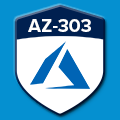Clientele ➞
























Duration: 5 Days
After successful completion of this BootCamp candidates will be able to:
Successful Azure Solution Architects start this role with experience on operating systems, virtualization, cloud infrastructure, storage structures, and networking.
Module 1: Implement Virtual Networking
Module 2: Implement VMs for Windows and Linux
Module 3: Automate Deployment and Configuration of Resources
Module 4: Implement Load Balancing and Network Security
Hands-on Lab: Implementing Highly Available Azure IaaS Compute Architecture
Module 5: Implement Storage Accounts
Module 6: Implement Azure Active Directory
Module 7: Implement and Manage Azure Governance
Hands-on Lab: Implementing and Configuring Azure Storage File and Blob Services
Hands-on Lab: Managing Azure Role-Based Access Control
Module 8: Implement and Manage Hybrid Identities
Module 9: Manage Workloads in Azure
Hands-on Lab: Protecting Hyper-V VMs by using Azure Site Recovery
Module 10: Implement Cloud Infrastructure Monitoring
Module 11: Manage Security for Applications
Module 12: Implement an Application Infrastructure
Hands-on Lab: Configuring a Message-Based Integration Architecture
Hands-on Lab: Implementing an Azure App Service Web App with a Staging Slot
Module 13: Implement Container-Based Applications
Module 14: Implement NoSQL Databases
Module 15: Implement Azure SQL Databases
A Certified Microsoft Azure Trainer
$1995
Our Partners
